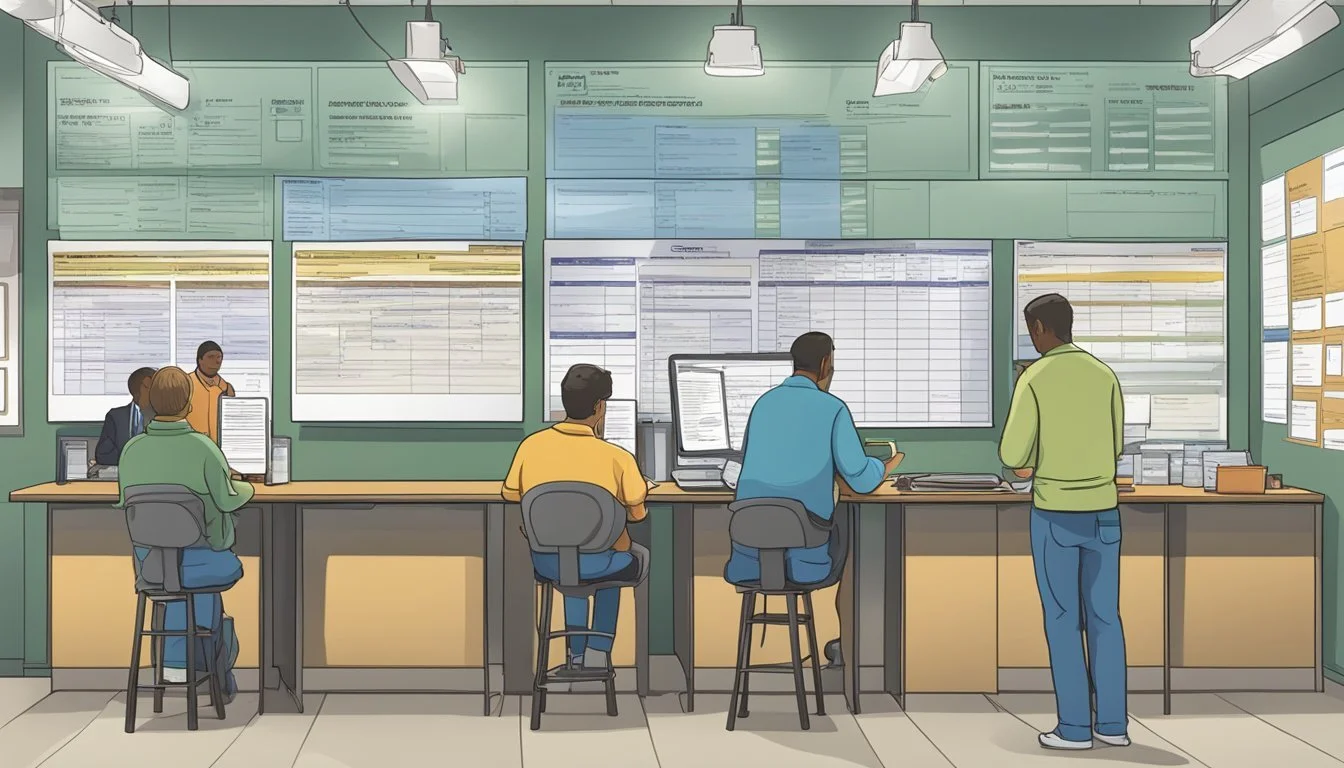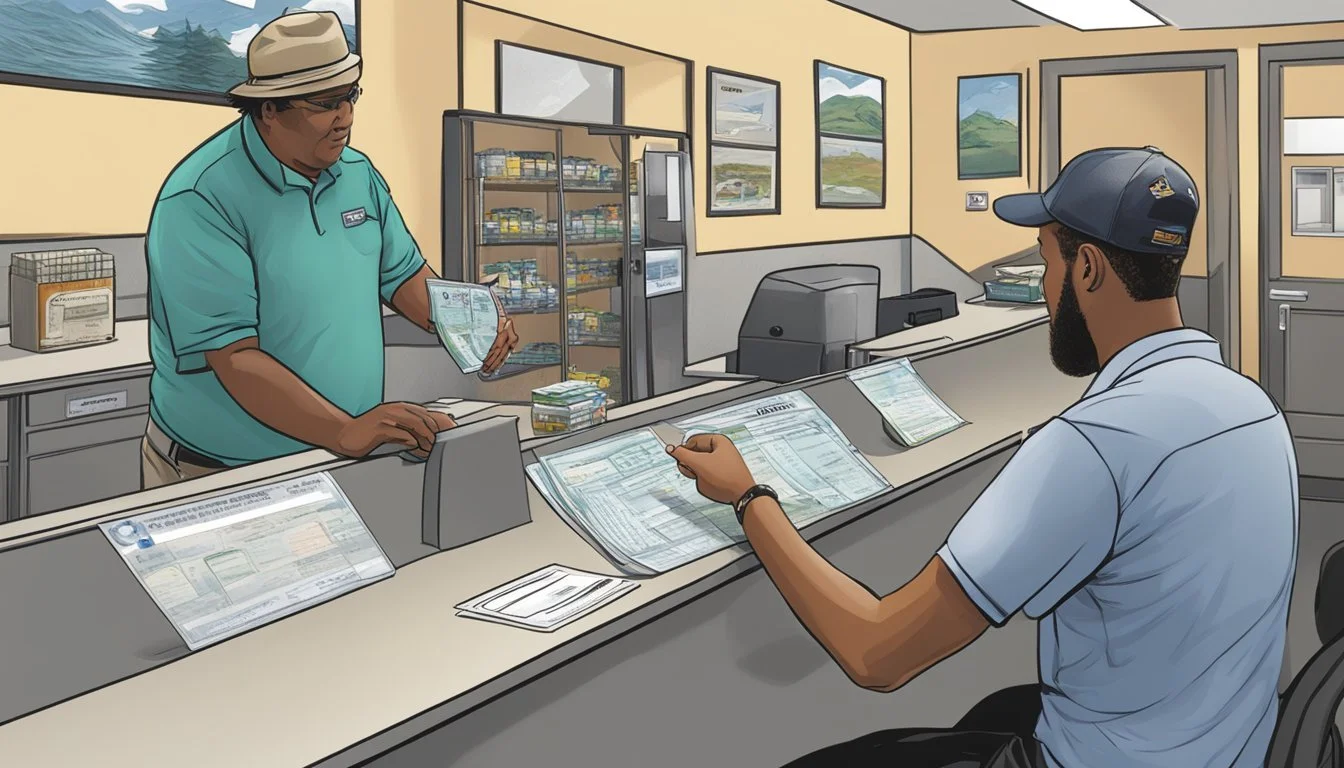How to Get a Virginia Freshwater Fishing License
A Step-by-Step Guide
Obtaining a freshwater fishing license in Virginia is an essential step for anglers who wish to fish (What wine goes well with fish?) in the state's lakes, rivers, and streams. The Department of Wildlife Resources (DWR) mandates that individuals, with certain exceptions, must have a valid fishing license in their possession while engaging in the activity. Licenses are available in different forms, including electronic copies, printed paper, or an annual hard card, allowing for versatility and convenience for fishers to have their license readily available to present to wildlife officers or property owners upon request.
Residents and non-residents alike can access a range of license packages designed to match specific fishing activities, ensuring compliance with state regulations. The process is user-focused and simplified through the Go Outdoors Virginia platform, where licenses can be purchased, and free unlimited reprints can be obtained 24/7, year-round. Special free fishing days, such as those scheduled from June 7-9, 2024, offer an opportunity for everyone to enjoy freshwater fishing without the need for a license, thus encouraging more people to take part and appreciate Virginia's natural aquatic resources.
Understanding the regulatory framework set by the Virginia DWR, including the general freshwater fishing regulations and creel limits, helps anglers ensure they are fishing responsibly and sustainably. Being equipped with the right license not only aligns with legal requisites but also supports the management and conservation efforts in Virginia, directly contributing to the maintenance and enhancement of the state's fish populations for current and future generations of fishing enthusiasts.
Understanding Virginia Fishing Licenses
When one seeks to fish in Virginia's freshwater systems, understanding the types of fishing licenses available and determining individual license needs are crucial first steps.
Types of Licenses
Virginia offers several types of fishing licenses to accommodate the diverse fishing community:
Resident Licenses: For individuals who have lived in Virginia for a continuous six months, proof of residency is required.
Non-Resident Licenses: Visitors or those who have not met the residency requirement.
Freshwater Fishing License: Needed for fishing in non-tidal freshwater sites.
Saltwater Fishing License: Required for fishing in tidal waters or where saltwater species are targeted.
Trout License: This is an additional permit needed if fishing for trout.
Sportsman’s License: This comprehensive option covers hunting and fishing privileges.
Lifetime Licenses: Available for both residents and non-residents, offering a one-time purchase for lifelong fishing rights.
Note: Specific rules apply for different age groups and situations. For example, residents under 16 and over 65, and nonresidents under 16 may have different regulations or exemptions.
Determining License Needs
Individuals must consider several factors to determine their specific licensing requirements:
Type of Water: Decide whether fishing will take place in freshwater or saltwater areas, as this will dictate whether a freshwater or saltwater license is needed.
Species Targeted: Targeting trout or fishing in certain stocked waters may require additional permits, such as a trout license.
Duration of License: Licenses can vary in duration from short-term (1-day, 5-day options) to annual and even lifetime licenses, suitable for both residents and nonresidents.
Age and Residency: Virginia residents have different requirements and fees compared to non-residents. Furthermore, youth and senior anglers may be eligible for exemptions or reduced fee licenses.
By carefully analyzing their fishing intentions and personal circumstances, anglers can select the appropriate licenses for their activities in Virginia's diverse aquatic environments.
Eligibility and Requirements
To fish in Virginia's freshwater locations, understanding the eligibility criteria and specific requirements for obtaining a license is crucial. Licenses are mandated for anglers, with different stipulations for residents and nonresidents, age groups, and those with special considerations.
Residency Qualifications
Virginia Resident: An individual must have established domicile within Virginia for a continuous period of at least six months prior to the license application. Active Duty Military personnel stationed in Virginia and students enrolled in Virginia schools are eligible as residents. Legal voters registered in Virginia also qualify.
Nonresident: Anyone not meeting the residency qualifications is considered a nonresident and must apply for a nonresident fishing license.
Special Considerations for Minors and Seniors
Minors (Under 16 years old): Not required to obtain a fishing license.
Seniors (Ages 65 and over): Eligible for a "65 and over annual freshwater fishing" license at a reduced cost.
It is important to note that both residents and nonresidents who are legally blind or disabled license holders may be eligible for exemptions or reduced fees.
Exceptions and Exemptions
Landowners and Tenants: Those who fish on their own lands or on lands they rent and reside on are exempt from license requirements. This exemption also extends to their immediate family members residing with them.
Private Ponds: Individuals fishing in private ponds not accessible by boat or other means from public waters do not require a license.
National and State Forest Permits: While these permits are separate from the fishing license, a fishing license is still required within national forests and state parks.
Exceptions exist for certain groups, such as the Indigenous Peoples fishing on their own land, as well as for individuals fishing during free fishing days set by the Virginia Department of Wildlife Resources.
Purchasing a Virginia Fishing License
Obtaining a Virginia fishing license is a straightforward process. It involves choosing the right type of license and then purchasing it through various available channels. These channels offer convenience and accessibility to both residents and non-residents who are 16 years of age or older, in compliance with the Virginia Department of Wildlife Resources (DWR) regulations.
Where to Buy
Virginia freshwater fishing licenses can be acquired from the Department of Wildlife Resources, either online or through approved license agents. The DWR provides a network of authorized vendors, including sporting goods stores, tackle shops, and even large retail chains. Alternatively, customers can use the Go Outdoors Virginia mobile app or website for purchases and additional fishing license information.
Online Process
Purchasing a license online is facilitated through the Go Outdoors Virginia website or the corresponding mobile app. To buy online now, one must create a customer account, which can be used to manage licenses and fulfill future purchases. The online process is efficient, allowing anglers to obtain their fishing license anytime and anywhere, with options for electronic or printed copies of the license.
Buy Online Now:
Visit the Go Outdoors Virginia website or app.
Create Customer Account or log in.
Select the required fishing license type.
Complete the purchase.
In-Person Options
For those preferring to purchase their license in person, Virginia offers multiple in-person options. They can visit any of the statewide license agents or DWR offices. This alternative is suitable for anglers who may need assistance or those without internet access.
Find License Agents:
Visit the DWR website for a list of agents.
Utilize the Go Outdoors Virginia app to locate nearby agents.
In-person purchases may include a small transaction fee.
License Types and Fees
When pursuing a fishing endeavor in Virginia, anglers must consider the type of water they plan to fish in—freshwater or saltwater—as there are distinct licenses for each. Additionally, Virginia offers various license durations—from short one-day licenses to long-term options. Individuals must also take into account specific licenses required for trout fishing and permits for fishing in national and state forests.
Freshwater vs. Saltwater Licenses
In Virginia, one needs a freshwater fishing license for inland waters or a saltwater fishing license for coastal and Chesapeake Bay waters. The fees for these licenses vary depending on the residency status of the angler:
Resident Freshwater Fishing License: $23.00 annually.
Non-resident Freshwater Fishing License: $47.00 annually.
Resident Saltwater Fishing License: $17.50 annually.
Non-resident Saltwater Fishing License: $25.00 annually.
Short-Term and Long-Term Licenses
Virgina also offers short-term and long-term license options:
1-Day Freshwater Fishing License: for residents and non-residents, allowing them to fish for 24 hours.
5-Day Freshwater Fishing or 5-Day Fresh/Saltwater Fishing: a flexible option for those planning a short-term trip that spans both freshwater and saltwater areas.
10-Day Saltwater Fishing License: specifically tailored for those targeting saltwater species over a longer, yet limited period.
Lifetime licenses are also available, providing a cost-effective solution for avid anglers who fish frequently in Virginia waters.
Special Licenses and Permits
Certain Virginia waters require specialized licenses or permits:
Trout License: needed in addition to the standard fishing license if fishing in designated stocked trout waters.
National Forest Permit: required for fishing in certain national forest waters.
County Dip Net Permit: necessary for those engaging in dip net fishing within specific counties.
State Forest Use Permit: for anglers fishing in state forest managed areas.
Tidal Boat Sport Fishing: required for those fishing from a boat in tidal waters.
License fees for these special permits differ, and additional information can be procured from the Virginia Department of Wildlife Resources' official website or their licensed agents.
Understanding Regulations and Compliance
To fish in Virginia's inland waters, understanding the regulatory framework and compliance requirements is essential. Anglers must be acquainted with license regulations, usage restrictions, and specific rules that apply to freshwater fishing.
Regulatory Bodies
The Virginia Department of Wildlife Resources (DWR) is the primary agency responsible for managing fishing regulations. This includes the issuance of freshwater fishing licenses and ensuring protection and conservation of aquatic wildlife. The DWR also regulates state forest use and provides specialized permits such as the Virginia State Forest Use Permit for certain state-owned forests.
License Usage and Restrictions
All anglers must carry their freshwater fishing license while engaging in fishing activities and present it upon request of enforcement officers or landowners. The license allows fishing by angling with a hook and line or rod and reel, with exceptions for nongame fish. These licenses are typically required for anyone fishing in freshwater, specifically in designated trout waters which include stocked trout waters and mountain trout waters.
Public Access Lands for Sportsmen (PALS) provide opportunities for fishing and hunting, but may require additional permits. It is important to note that a freshwater fishing license does not include saltwater fishing, hunting, or trapping, which require separate permits or licenses.
Reciprocal Agreements and Special Rules
Virginia acknowledges reciprocal licenses, allowing anglers to fish in portions of waters shared with neighboring states such as the South Holston Reservoir, where a license from either Virginia or Tennessee is valid. Special regulations govern these areas and must be closely followed to ensure legal compliance. Certain dates are also designated as Free Freshwater Fishing Days, allowing fishing without a license to encourage public participation in the sport.
Fishing in Virginia
Virginia offers an array of fishing experiences, from mountain trout streams to expansive inland waters. Whether an angler seeks the challenge of game fish or the tranquility of a remote creek, obtaining a Virginia fishing license paves the way to these opportunities.
Fish Species and Habitats
Virginia's freshwater ecosystems harbor a diverse range of fish species, providing a vibrant angling scene. Trout fishing is particularly celebrated in the mountainous regions, with native brook trout in the streams of the Appalachians standing out. The Clinch Mountain and Douthat State Park offer habitats that support an abundant trout population. Furthermore, tidal waters and inland waters like Crooked Creek equally contribute to the rich tapestry of habitats that sustain species such as bass, crappie, and catfish.
Notable Freshwater Fish in Virginia:
Trout: Brook, Rainbow, and Brown
Bass: Largemouth, Smallmouth, and Striped
Others: Catfish, Crappie, and Walleye
Accessible Fishing Locations
Virginia's commitment to accessible fishing ensures that anglers can readily enjoy the state's freshwater bounty. Public fishing lakes, rivers, and ponds are strategically situated throughout the state. In addition, urban anglans have opportunities to fish in designated areas. Popular fishing locations with developed facilities include:
Douthat State Park: Known for its stocked trout waters.
Clinch Mountain: Offers wild trout streams and scenic landscapes.
Crooked Creek: Provides excellent smallmouth bass fishing.
Opportunities for Anglers
Anglers in Virginia can take advantage of various fishing opportunities throughout the year. Designated “Free Freshwater Fishing Days” allow individuals to fish without a license, encouraging newcomers to experience Virginia's angling offerings. For those targeting specific species, there are seasons and regulations tailored to maintain sustainable fisheries and enhance the fishing experience. To legally fish in Virginia waters, residents and non-residents must possess an appropriate Virginia fishing license.
Virginia Fishing Opportunities:
Recreational fishing for an array of freshwater species.
Scheduled stocking of game fish in certain areas.
Managed access points for public fishing, including piers and boat ramps.
Additional Resources and Services
For anglers looking to secure a Virginia freshwater fishing license, a suite of resources and support services is available to aid the process. They range from a dedicated customer service team ready to assist with inquiries to specific programs aimed at streamlining the licensure and supporting conservation efforts.
Customer Service and Support
The Department of Wildlife Resources (DWR) offers extensive customer service support to prospective anglers. Individuals can create a customer account through the DWR's online system for easy management of their licensure information. For assistance, anglers can contact DWR's customer service directly for help with obtaining licenses, managing accounts, and answering questions regarding fishing regulations.
Fisherman Identification Program (FIP)
Virginia's Fisherman Identification Program (FIP) is a free service that is crucial for anglers who are exempt from requiring a freshwater license, such as those fishing in licensed fee-fishing areas like Douthat State Park. Enrollees receive an FIP number which must be reported during conservation efforts and surveys. This program is critical in the DWR's efforts to manage and conserve fish populations.
Benefits for Landowners and Tenants
Landowners and their tenants, along with immediate family members, may fish on their own property without a Virginia freshwater fishing license. This benefit extends to private ponds and stretches of freshwater on their land. However, if they wish to fish statewide or in special Douthat State Park fee fishing areas, they must obtain the necessary permits or licenses. The DWR provides access permits for certain fee areas and resources for landowners to learn more about their fishing privileges.








